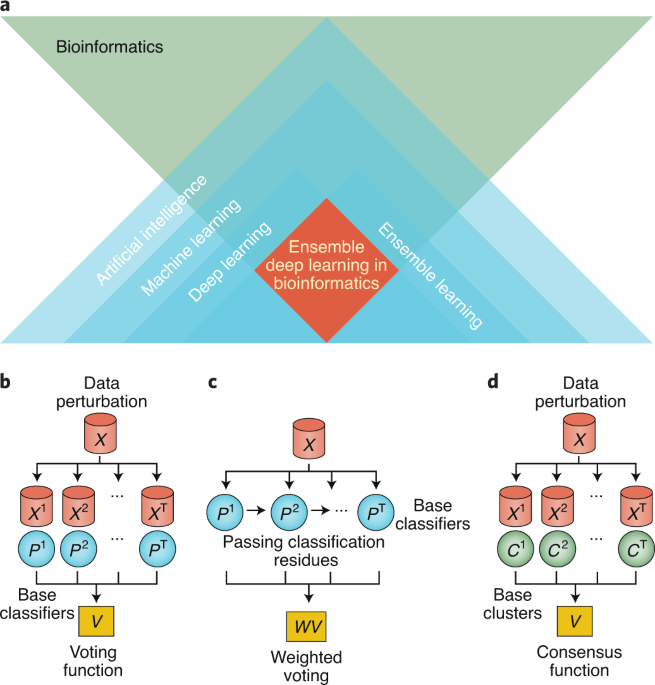The smart Trick of Bioinformatics Tutor That Nobody is Talking About
The smart Trick of Bioinformatics Tutor That Nobody is Talking About
Blog Article
Some Of Bioinformatics Tutor
Table of ContentsOur Bioinformatics Tutor PDFsBioinformatics Tutor - The FactsAll About Bioinformatics TutorSome Of Bioinformatics TutorThe Facts About Bioinformatics Tutor Revealed
Initial project development is rather lengthy, as it entails mindful preparation of the topic, structuring of deliverables, and consideration of the skills and experience degrees of individuals. When a project has been clearly defined and executed, it has the prospective to be reused in future sessions with only minor alterations to mirror updates in the field or accommodate distinctions in participant histories. This makes project-based discovering a sustainable and efficient mentor technique in the future, particularly in rapidly advancing self-controls like bioinformatics.To ensure connection and reproducibility of knowing, giving shared laboratory notebooks-- either physical or electronic-- is crucial. These note pads work as collective logs where students can tape their progress, code, methods, and results throughout the course. Not just do they reinforce knowing by urging paperwork and representation, but they likewise offer as post-course recommendation products that participants can seek advice from in future research or academic tasks.
Mentors play an important role in the success of project-based training courses. Mentors also act as function models and inspire trainees to proceed going after careers in computational biology and related fields.
The Main Principles Of Bioinformatics Tutor
One more key facet of the discovering process is giving individuals the opportunity to offer their work to others, particularly to a target market beyond their prompt project team. Last presentations or mini-conferences permit trainees to express their findings, get constructive responses, and gain confidence in communicating clinical content. This discussion component is often a favored among trainees, as it validates their initiatives and highlights the real-world relevance of their job.
The effectiveness of this technique was evidenced by the extremely favorable feedback obtained after the initial program was offered. The success triggered repeat offerings of the very same course style in 2015 and 2016. Each model of the program was fine-tuned based on individual responses and developing ideal practices in pedagogy. These adjustments ensured that the core goals-- hands-on understanding, collaboration, and applied analytical-- stayed undamaged while increasing the deepness and breadth of subjects covered.
A notable visualization that captured individual view was a word cloud created from feedbacks to the 2014 end-of-course study. This aesthetic comments reinforced the program's emphasis on experiential learning and advisor assistance.
The payments of people such as Rustici, G., Orchard, S., Cowley, A., and Twells, R., in addition to various other participants of the EBI user-training-working group, contributed in refining the training course framework and material. Their insights helped form a flexible and comprehensive design that could be adapted to numerous institutional and regional contexts.
Getting The Bioinformatics Tutor To Work

Jones, Rasmussen, and Moffitt (1997) likewise advocated for interdisciplinary learning through collaborative task job, noting its capability to mimic professional environments and prepare pupils for future scholastic or market roles. In a comprehensive review, Thomas (2000) assessed numerous research studies on PBL and concluded that students not only execute well academically however also create a much deeper understanding of the subject matter and enhanced team effort abilities.
In the context of bioinformatics education and learning, ingenious methods like classroom Click Here games and simulation-based training have actually also been utilized. Schneider and Jimenez (2013) presented the usage of interactive games to instruct organic information integration, enabling pupils to realize complicated principles via experiential discovering. This type of gamification matches the hands-on discovering highlighted in project-based courses by presenting an element of enjoyable and competitors, which can further enhance engagement.
Returning to the training course talked about below, the lessons found out from the implementation of project-based knowing in a bioinformatics setting have more comprehensive ramifications for various other STEM fields. The methodology stresses not just technical proficiency, however also communication, partnership, and crucial reasoning-- abilities that are increasingly valued in both academia and sector.
All about Bioinformatics Tutor
The scalability of the program style likewise makes it a sensible version for various other establishments. With ideal modification based upon neighborhood requirements, offered resources, and participant profiles, the framework can be replicated or adjusted for usage in various other scientific domains. Additionally, the inclusion of structured mentorship and analysis approaches aids make sure constant high quality and measurable knowing outcomes.

In final thought, project-based knowing in bioinformatics offers an effective strategy to mentor complex, interdisciplinary content in such a way that is both easily accessible and intellectually promoting. By emphasizing cooperation, functional application, and vital inquiry, such campaigns not just enhance specific discovering but additionally add to the cultivation of a brand-new generation of innovative and proficient researchers.
The Best Strategy To Use For Bioinformatics Tutor

Another secret aspect of the understanding process is providing individuals the opportunity to provide their work to others, specifically to an audience past their immediate task group.In the more comprehensive educational literary works, project-based learning (PBL) has actually been extensively examined and confirmed as an efficient method for promoting deep understanding, critical reasoning, and transferable abilities. Adderley et al. (1975) highlighted the worth of project techniques in greater education, keeping in mind that they advertise active discovering and autonomy. Schneider article and Jimenez (2013) introduced the usage of interactive games to instruct organic information integration, making it possible for students to understand intricate concepts with experiential discovering.
Report this page